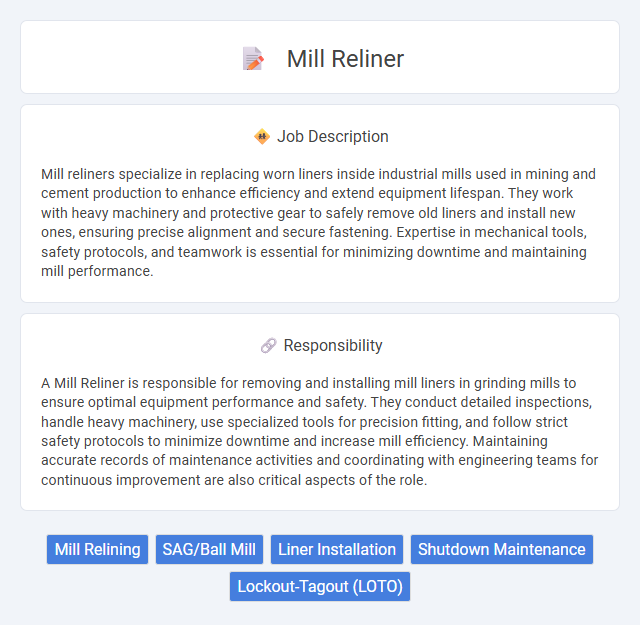
Mill reliners specialize in replacing worn liners inside industrial mills used in mining and cement production to enhance efficiency and extend equipment lifespan. They work with heavy machinery and protective gear to safely remove old liners and install new ones, ensuring precise alignment and secure fastening. Expertise in mechanical tools, safety protocols, and teamwork is essential for minimizing downtime and maintaining mill performance.
The Mill Reliner job may likely require individuals with strong physical endurance and a tolerance for working in challenging, confined environments. Candidates who tend to have good attention to detail and can handle repetitive, precise tasks might be more suitable for this role. People prone to claustrophobia or with limited physical stamina may face difficulties adapting to the demands of this position.
Qualification
A Mill Reliner must possess extensive knowledge of heavy machinery maintenance and safety protocols, with hands-on experience in industrial mill environments. Certification in rigging and confined space entry, along with strong mechanical aptitude and the ability to interpret technical schematics, is essential. Proficiency in using precision tools and adherence to OSHA regulations significantly enhance job performance and workplace safety.
Responsibility
A Mill Reliner is responsible for removing and installing mill liners in grinding mills to ensure optimal equipment performance and safety. They conduct detailed inspections, handle heavy machinery, use specialized tools for precision fitting, and follow strict safety protocols to minimize downtime and increase mill efficiency. Maintaining accurate records of maintenance activities and coordinating with engineering teams for continuous improvement are also critical aspects of the role.
Benefit
Mill reliner jobs likely offer significant benefits, including enhanced safety due to the use of specialized equipment minimizing manual labor risks. Workers may experience improved production efficiency, as timely relining helps maintain optimal mill performance and reduces downtime. There is a probable chance of developing valuable technical skills that increase job security and career advancement opportunities within the mining or industrial sectors.
Challenge
The Mill Reliner job likely involves high-risk tasks requiring precise coordination and physical endurance to safely replace worn liners in grinding mills. Challenges may include working in confined spaces under extreme conditions, which could increase the probability of accidents or injuries if strict safety protocols are not followed. Managing heavy equipment and materials under tight time constraints might also contribute to the job's difficulty, demanding consistent vigilance and skill.
Career Advancement
Mill reliners enhance their careers by developing expertise in heavy machinery maintenance and safety protocols, which are critical in mining and industrial sectors. Progression often leads to supervisory roles overseeing relining teams, project management positions, or specialized technical consulting. Mastery of mill relining processes combined with certifications in industrial safety significantly boosts employment opportunities and earning potential.
Key Terms
Mill Relining
Mill relining involves the precise removal and replacement of worn or damaged liners inside grinding mills to maintain optimal milling efficiency and prevent equipment failure. Specialized technicians dismantle heavy components using hydraulic tools and cranes, ensuring accurate installation of new liners made from high-grade manganese steel or composite materials. Efficient mill relining minimizes downtime and enhances mill performance by maintaining consistent grinding conditions and extending the lifespan of the mill shell and liners.
SAG/Ball Mill
A Mill Reliner specializes in the precise removal and replacement of worn liners inside SAG and Ball Mills, ensuring optimal grinding performance and minimizing downtime. Expertise in handling heavy equipment and understanding mill geometry is critical for maintaining proper liner fit and extending the life of the mill. Efficient relining improves throughput and reduces operational costs in mineral processing plants.
Liner Installation
Mill reliners specialize in the precise installation of liners within grinding mills, ensuring optimal protection against wear and extending equipment lifespan. Their expertise includes handling and fitting heavy-duty steel liners, aligning replacement components accurately to maintain mill efficiency. Proper liner installation reduces downtime, enhances grinding performance, and minimizes operational costs in mining and industrial milling processes.
Shutdown Maintenance
Mill reliner jobs during shutdown maintenance involve the complete removal and replacement of worn-out mill liners to optimize grinding efficiency and equipment longevity. This critical task requires precise planning, heavy lifting equipment, and strict safety protocols to minimize downtime and prevent damage to the mill shell. Skilled technicians conduct inspections and installations, ensuring the mill's interior is properly lined to withstand abrasive materials and maintain peak operational performance.
Lockout-Tagout (LOTO)
Mill Reliners perform critical maintenance by removing and replacing worn mill liners to ensure efficient grinding operations. Strict adherence to Lockout-Tagout (LOTO) procedures is essential to eliminate energy hazards, safeguard workers, and prevent accidental machinery startup during liner replacement. Applying LOTO protocols involves isolating power sources, verifying de-energization, and securing lock devices until maintenance completion.
 kuljobs.com
kuljobs.com